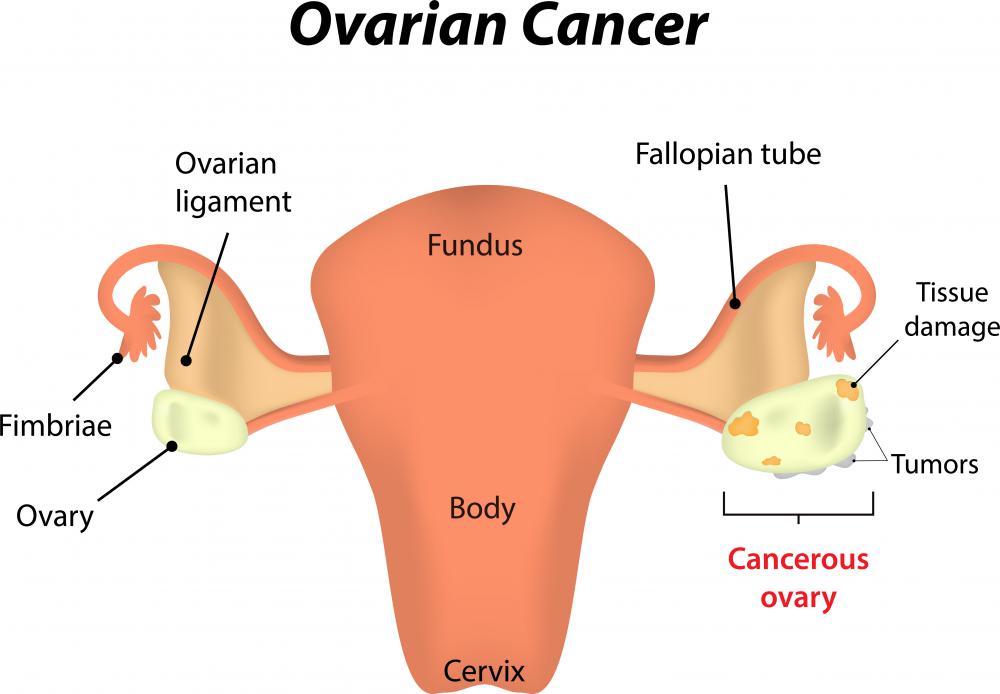At TheHealthBoard, we're committed to delivering accurate, trustworthy information. Our expert-authored content is rigorously fact-checked and sourced from credible authorities. Discover how we uphold the highest standards in providing you with reliable knowledge.
What is an Omentectomy?
In medicine, an omentectomy is a procedure in which part or all of the abdominal lining is removed. The tissue that is removed is called the omentum. This fatty organ is made up of an area of lining, or peritoneum, which encases the stomach and other abdominal organs. The omentum was long considered to perform no important functions, but biologists now believe that it may have an important role to play in the maintenance of the internal physiological environment.
An omentectomy procedure may involve the complete removal of the omentum, in which case it is called a total or supracolic omentectomy. A partial omentectomy involves the removal of only a proportion of the omentum. Surgical removal of the omentum may be performed by cutting an incision in the abdomen, or alternatively via a small opening, in which case it is called a laparoscopic omentectomy.

In cases of ovarian, intestinal, or endometrial cancer, the omentum may be performed if cancerous cells have migrated into it. In these cases, the removal is likely to be carried out during surgery performed to remove the primary tumor. The removal of the omentum may also reduce the chances of cancer spreading from nearby organs to the stomach, so in some cases the procedure may be performed as a precautionary measure, even if the omentum is not yet harboring detectable cancerous cells.

In some cases, omentectomies may be performed on patients suffering from diabetes. This procedure is most often performed when the patient is obese. Removal of the omentum may improve the patient’s long-term insulin resistance. While the function of the omentum is not completely understood by biologists, it seems to play a significant role in glucose and fatty acid metabolism, which is likely to be the reason that it is implicated in diabetes.

The removal of the omentum itself is usually considered a relatively safe procedure. Documented side effects tend to be rare and minor. When performed along with other surgery, this procedure is often regarded as the safest part. Complications arising after the surgery are more frequently ascribed to the trauma of the surgery itself, rather than as a direct result of the removal of the omentum. In spite of this general view, some doctors believe that removal of the omentum is not something to be undertaken lightly, as the long-term impact of an omentectomy on a patient is not fully understood, and the procedure may have wide-ranging physiological implications.
AS FEATURED ON:
AS FEATURED ON:















Discussion Comments
Are omentectomies done as part of the treatment for stomach ulcers? I heard about this but I don't really understand why that is necessary. I would think that the lining helps protect the stomach from damage due to ulcers.
I know that the biggest threat from an ulcer is for the stomach acid to come into contact with other organs and start eating away at it. Wouldn't the omentum help prevent that from happening?
My grandmother is about to have this surgery. I've been doing some reading to find out what the omentectomy side effects and risks are. I found out that there can be complications during the surgery. The spleen or bowel could be injured while the omentum is removed and there could be bleeding as well. If there is bowel trauma, a second surgery could even be required.
So how well the surgery goes and how the patient does afterward is really in the hands of the doctors who are operating. I agree with doctors who say that this operation should not be taken lightly.
The doctor who is going to be operating on my grandmother is very experienced and well known. I'm really happy that she she's going to be in safe hands and hopefully there won't be any complications.
There was a presentation about this at a conference I went to about cancer. They were saying that doctors want to and should do an omentectomoy while removing other tumors in that area even if the tumor hasn't moved to the omentum yet. The reason that was given is because the omentum collects cancerous cells and helps them spread.
I didn't understand it then, but after reading this article, it makes sense. The omentum has the job of maintaining and regulating the internal environment, so it can do the same with cancer cells.
That is why they are doing omentectomies not just with ovarian cancer but colon cancer as well now.
I've heard that recently surgeons have begun experimenting with omentectomies to assist in treating obesity -- my sister has metabolic syndrome, so we've all been doing some research to find out how to help her. Apparently, patients who received the procedure as well as a standard gastric bypass compared to those who only received the gastric bypass showed improved metabolism including fasting glucose and cholesterol. Considering how many people suffer from this metabolic disorder it's good to know progress is always being made.
Post your comments